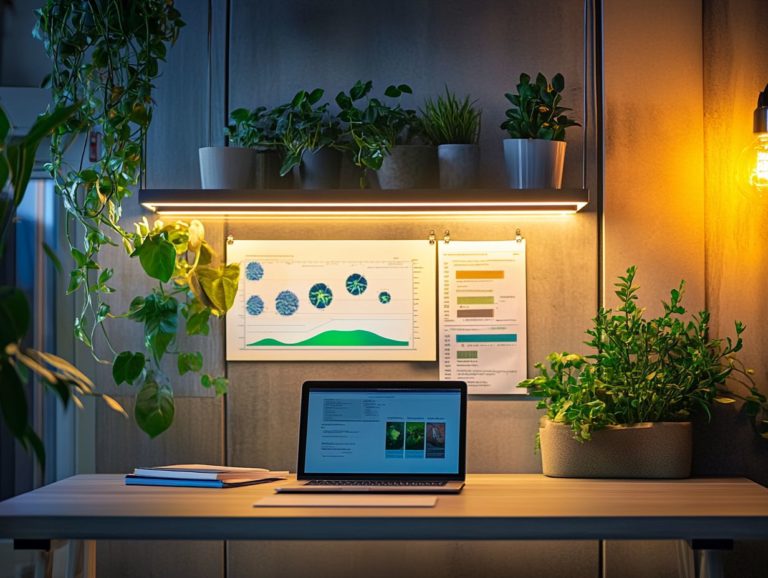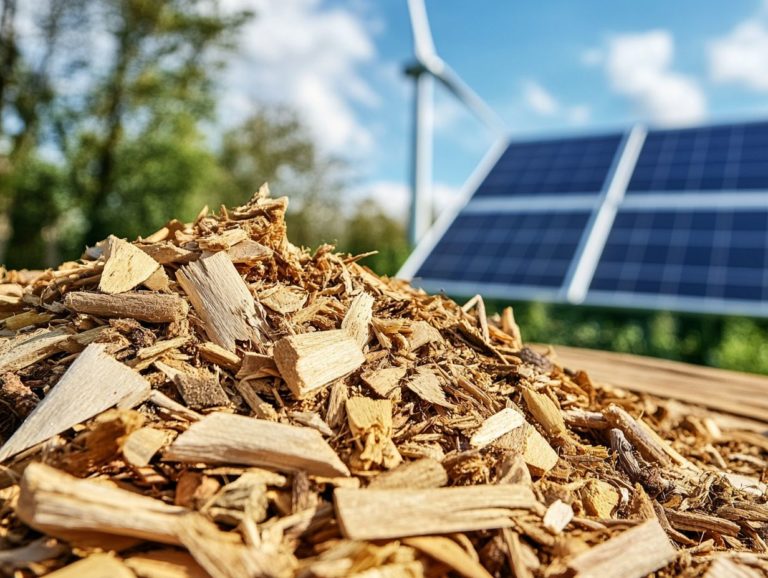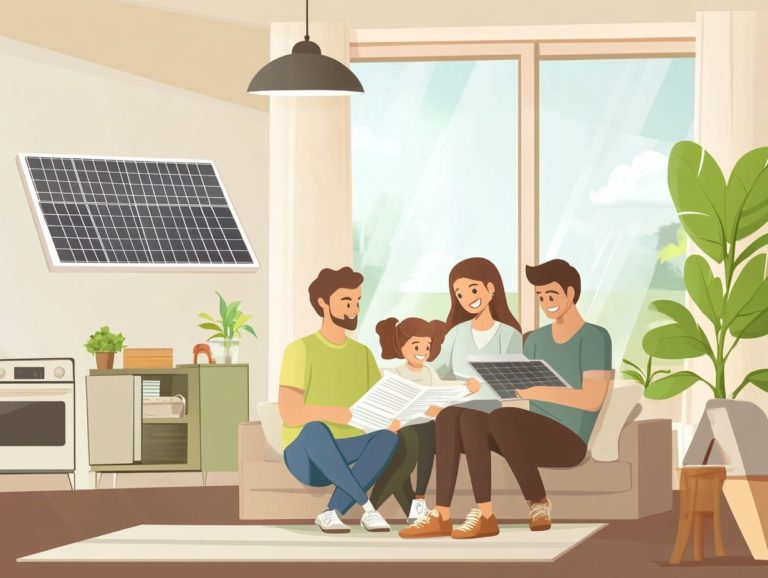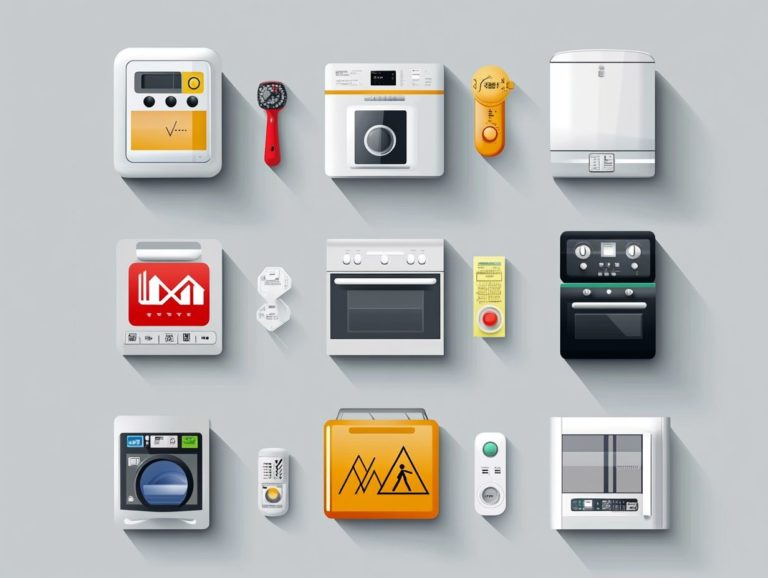How to Conduct a Home Renewable Energy Assessment?
As the world embraces sustainable practices, grasping the concept of renewable energy becomes increasingly vital for you as a homeowner. Not only can it help you reduce your carbon footprint, but it can also lead to significant savings on your energy bills.
Conducting a home energy audit can provide deeper insights into your energy consumption and highlight areas for improvement. This article uncovers the exciting world of renewable energy, focusing on its numerous benefits while guiding you through assessing your home’s energy needs.
You ll learn how to evaluate your energy needs and explore various sources like solar and wind. This knowledge will equip you to make informed decisions that align perfectly with your budget and lifestyle. A thorough energy audit report is essential for understanding your home’s energy performance and making energy-efficient upgrades.
Jump in and learn how to harness renewable energy for a greener, more efficient home by following this DIY energy audit.
Contents
- Key Takeaways:
- Understanding Renewable Energy
- Benefits of a Home Renewable Energy Assessment
- How to Conduct a Home Renewable Energy Assessment
- Factors to Consider in a Home Renewable Energy Assessment
- Types of Renewable Energy Sources
- Choosing the Right Renewable Energy System for Your Home
- Frequently Asked Questions
- What is a home renewable energy assessment?
- Why is it important to conduct a home renewable energy assessment?
- Who can conduct a home renewable energy assessment?
- What are the steps involved in conducting a home renewable energy assessment?
- What are some things to consider before conducting a home renewable energy assessment?
- What Are Common Recommendations from a Home Renewable Energy Assessment?
Key Takeaways:
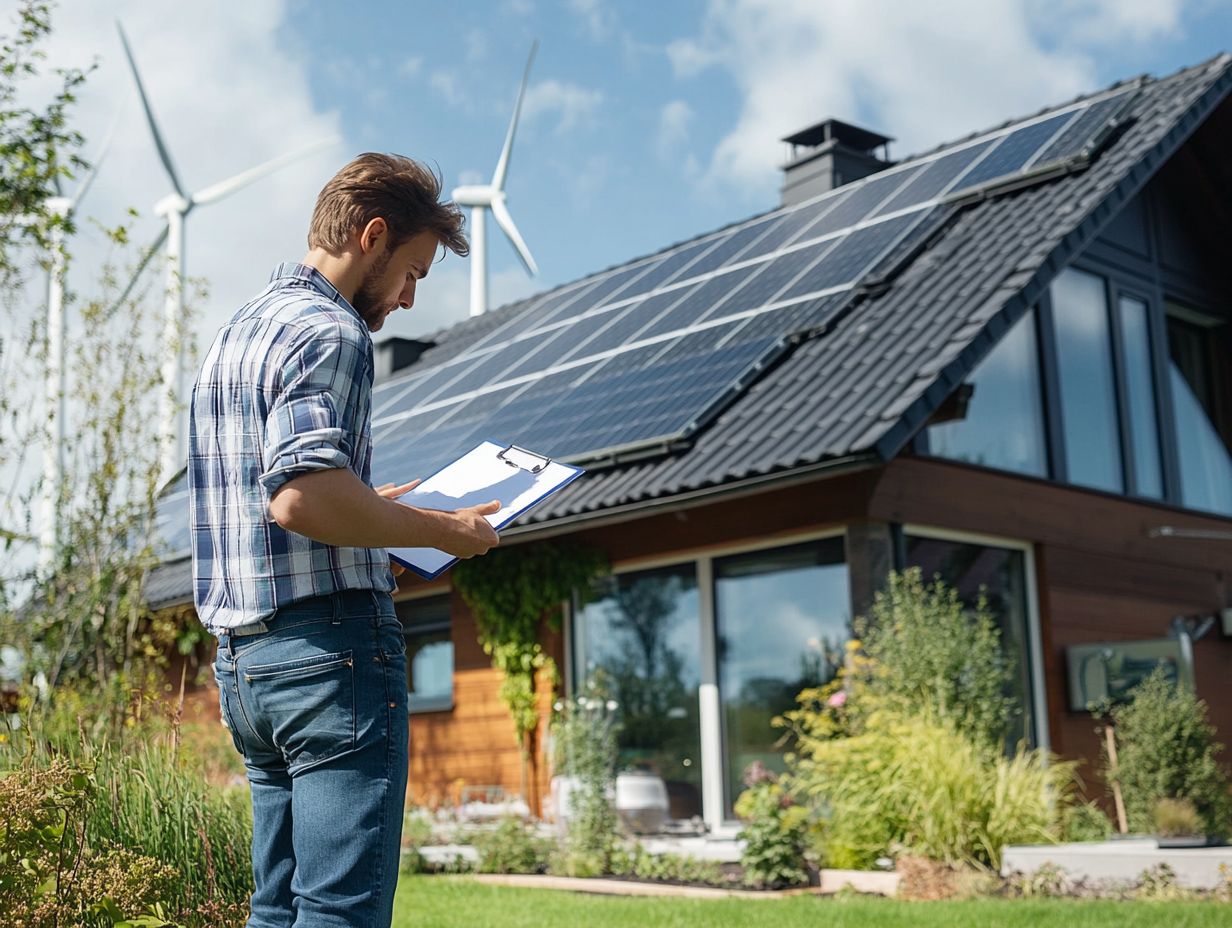
- Understand the concept and potential of renewable energy to reduce your carbon footprint and save money on energy bills.
- A home renewable energy assessment can help you identify the most suitable and cost-effective renewable energy system for your home.
- Think about your location, energy needs, and budget when assessing your home’s energy needs, and compare options to find the best fit.
Understanding Renewable Energy
Understanding renewable energy is essential for homeowners like you who want to boost energy efficiency and embrace a sustainable lifestyle. Sources such as solar, wind, hydro, and geothermal power provide eco-friendly alternatives to fossil fuels. These sources significantly cut down on carbon emissions and benefit the environment.
By integrating renewable energy systems into your home, you re not just helping the planet; you re also paving the way for long-term savings on your utility bills. Renewable energy allows you to assess your energy consumption comprehensively, enabling you and your family to make informed choices about how you use energy and manage your HVAC systems (heating, ventilation, and air conditioning).
What is Renewable Energy?
Renewable energy is essentially energy sourced from natural elements that replenish themselves faster than they are consumed think solar, wind, hydro, and geothermal. This dynamic form of energy is pivotal in combating climate change and lessening our reliance on fossil fuels.
Each type of renewable energy harnesses the power of nature, offering distinct applications and benefits, particularly when assessed through a comprehensive energy audit tailored to your home.
- Solar energy: Captures sunlight through photovoltaic cells (devices converting sunlight into electricity), making it an excellent choice for residential and commercial electricity generation.
- Wind energy: Relies on turbines (machines that convert wind or water energy into mechanical energy) to transform wind movement into power, suitable for everything from large farms to smaller setups.
- Hydroelectric power: Seizes the energy from flowing rivers, enabling substantial electricity production while aiding in flood control and irrigation.
- Geothermal energy: Taps into the Earth s heat, providing reliable and sustainable heating and cooling solutions, especially in areas with volcanic activity.
Together, these renewable sources play a vital role in enhancing energy efficiency and promoting sustainable living, all while cutting down carbon emissions and fostering a sense of energy independence.
Benefits of a Home Renewable Energy Assessment
A home renewable energy assessment provides you with a wealth of advantages. It helps pinpoint opportunities for energy-efficient upgrades, revealing the potential for significant savings on your utility bills.
By enhancing your home’s energy performance, you contribute to a more sustainable living environment, enriching both your lifestyle and the planet’s health.
Cost Savings and Environmental Impact
Implementing energy-efficient upgrades helps you save significantly on utility bills. It also reduces carbon emissions and improves your environmental impact.
These upgrades lower energy consumption and can unlock financial incentives, including rebates from utility companies and government programs. By investing in renewable energy systems, like solar panels, you can lower your long-term energy costs and earn tax credits.
Switching to energy-efficient appliances enhances these benefits. You reduce monthly expenses while contributing to a sustainable future.
How to Conduct a Home Renewable Energy Assessment
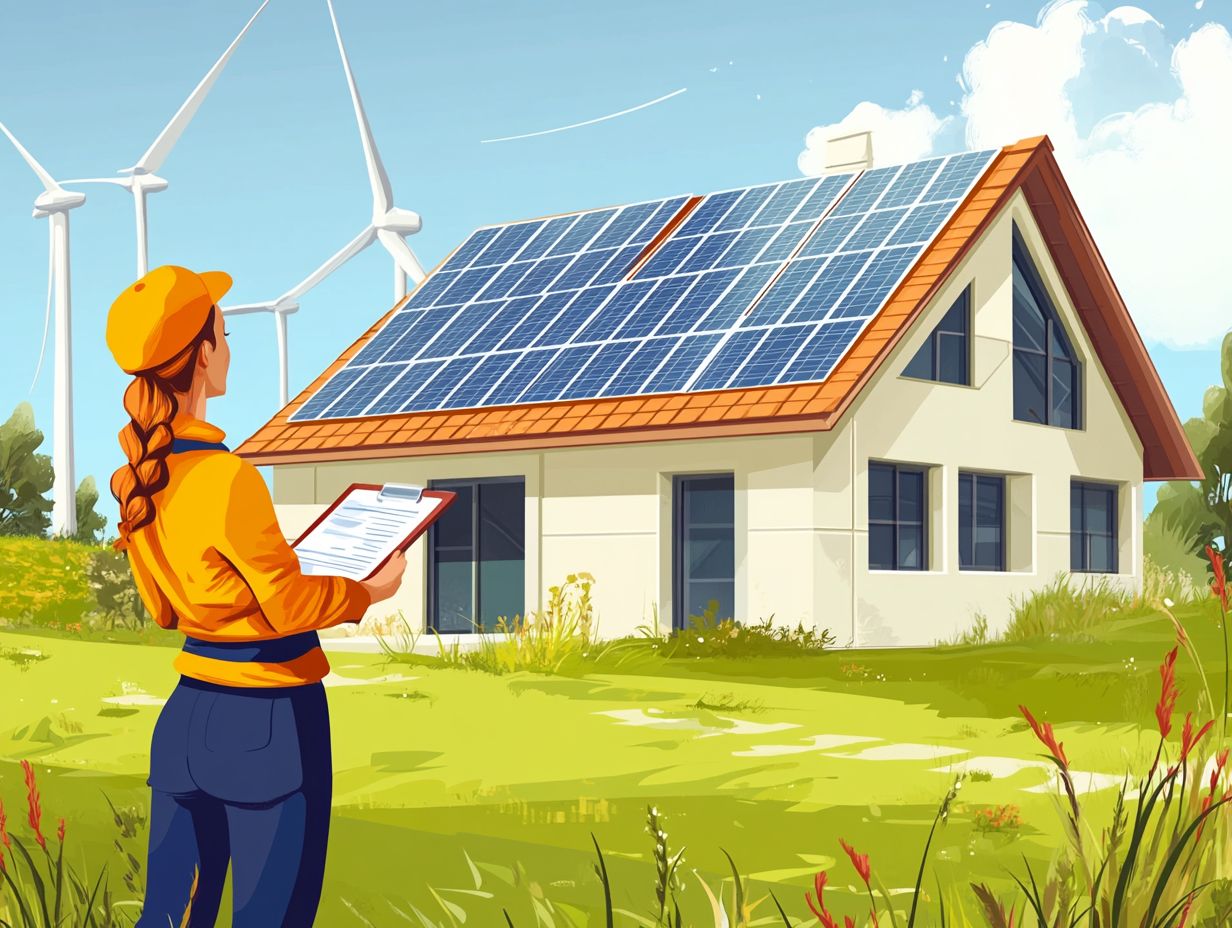
You can conduct a home renewable energy assessment yourself or hire a professional energy audit service. Both methods evaluate your home s energy performance effectively.
Step-by-Step Guide
Conducting a home energy audit involves assessing insulation, examining heating, ventilation, and air conditioning (HVAC) systems, and identifying air leaks. You might also use thermal imaging to pinpoint energy loss.
This audit empowers you to cut energy consumption and improve your home s performance. Start by checking insulation in attics, walls, and basements for gaps or outdated materials.
Next, look at your HVAC systems. Keep them well-maintained, replace filters regularly, and schedule a professional check-up for optimal performance.
Identifying air leaks is crucial. A simple test with incense or a draft detector can reveal problem areas around windows and doors.
Using thermal imaging technology gives you a clear visual map of energy loss. Addressing these issues not only saves money but also promotes sustainable living.
Factors to Consider in a Home Renewable Energy Assessment
Consider several key factors when assessing your home for renewable energy. Your location affects the types of systems that will be most effective.
Evaluate your specific energy needs and budget constraints. These elements significantly influence your choices in renewable energy solutions.
Location, Energy Needs, and Budget
Your home s location, energy requirements, and budget are essential in choosing suitable renewable energy options. For instance, sunny areas benefit greatly from solar energy systems.
If you live in a windy area, wind turbines may be the better choice. The terrain also impacts options; rural settings may allow for larger systems, while urban areas might require compact solutions.
Your budget matters, too. Initial investments vary across technologies, and regional incentives can help ease costs. Understanding these factors helps you align energy needs with available resources.
Types of Renewable Energy Sources
The primary renewable energy sources include solar, wind, hydro, and geothermal. Each option offers unique advantages, seamlessly meeting your residential energy needs.
Solar, Wind, Hydro, and Geothermal
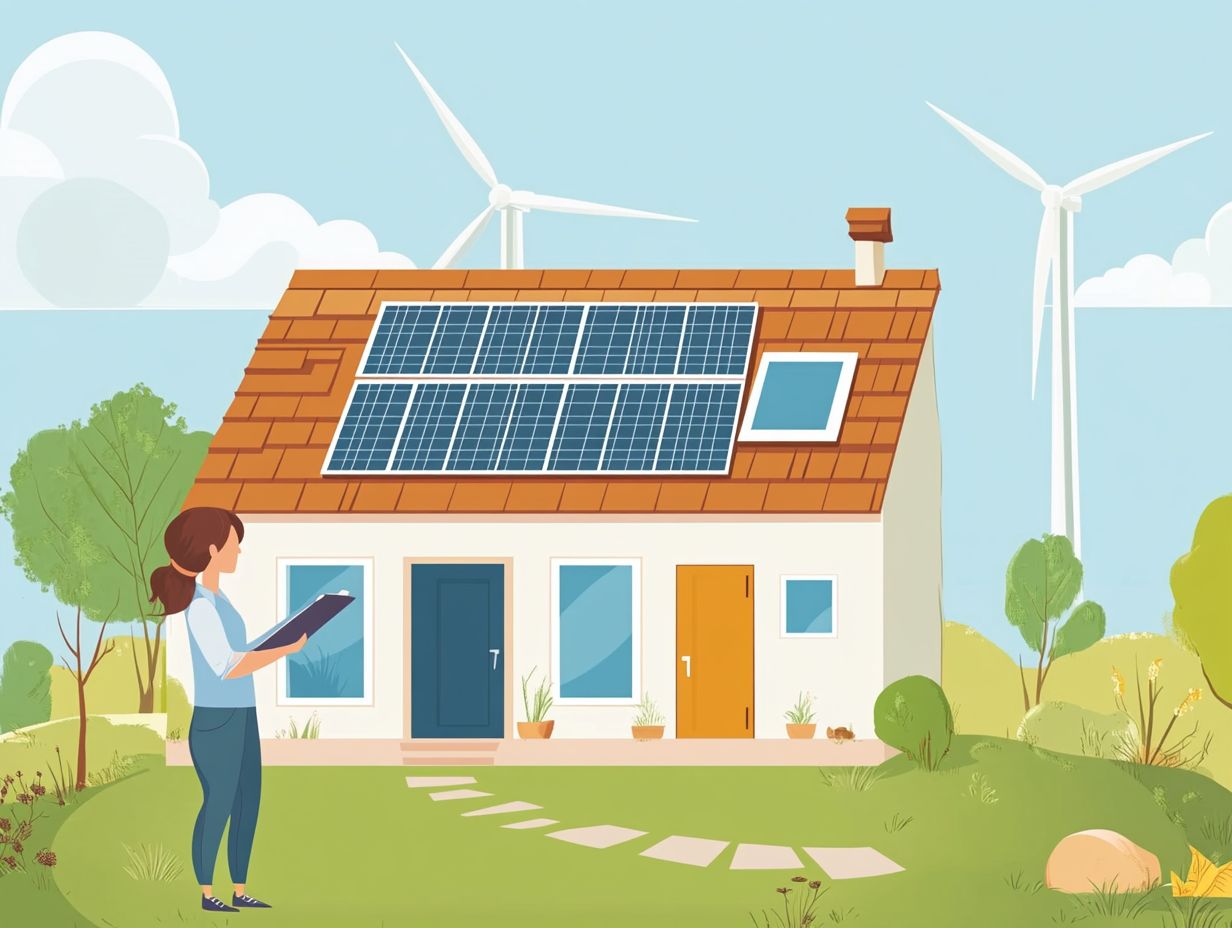
Solar, wind, hydro, and geothermal energy harness the power of nature to generate electricity. These essential renewable energy sources play a crucial role in promoting sustainability and enhancing energy efficiency.
Solar energy captures sunlight using photovoltaic cells devices that convert sunlight into electricity. Wind energy relies on turbines that spin in response to winds, converting that motion into power. Hydro energy takes advantage of flowing water, often from rivers or dams, to turn turbines and produce electricity. Meanwhile, geothermal energy taps into the Earth’s internal heat, utilizing steam or hot water to generate energy.
These renewable sources offer incredible benefits! They significantly lower greenhouse gas emissions, helping to combat climate change. Additionally, they lead to reduced utility costs for consumers as reliance on fossil fuels diminishes. Embracing these energy solutions benefits both the environment and your energy independence. Now is the time to make the switch!
Choosing the Right Renewable Energy System for Your Home
Selecting the ideal renewable energy system for your home requires a careful review of the options available. Consider your energy needs, budget limitations, and the unique attributes of each energy source.
This thoughtful approach ensures that you make informed decisions that align perfectly with your lifestyle and goals.
Factors to Consider and Comparison of Options
When comparing renewable energy systems, consider factors such as:
- Initial costs
- Maintenance requirements
- Energy output
- How well they fit with your existing home infrastructure
These elements shape the overall feasibility of each option and play a crucial role in determining long-term economic benefits and environmental impact. For instance, while solar panels might demand a higher upfront investment, they can lead to significant savings on your energy bills over time. On the other hand, wind turbines might deliver impressive energy output in certain climates, yet they could require additional infrastructure for installation.
Understanding regional variations such as the availability of sunlight or wind can profoundly influence performance and efficiency. By carefully evaluating these aspects, you can make informed choices that align perfectly with your unique energy needs and financial situation.
Frequently Asked Questions
What is a home renewable energy assessment?
A home renewable energy assessment evaluates your home’s energy usage and potential for using renewable energy sources, such as solar or wind power.
Why is it important to conduct a home renewable energy assessment?
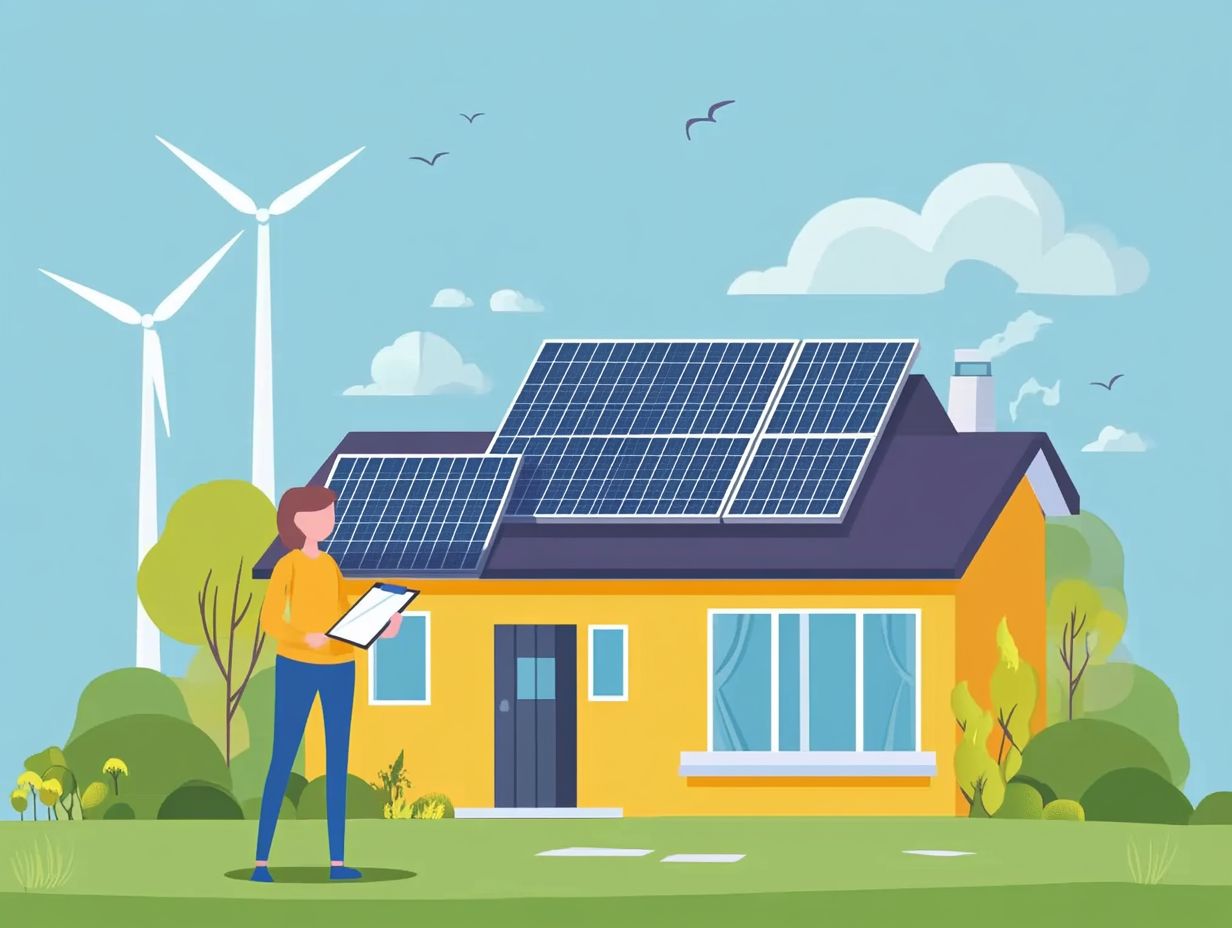
Conducting a home renewable energy assessment helps you identify ways to reduce your energy usage, save money on utility bills, and decrease your carbon footprint.
Who can conduct a home renewable energy assessment?
A home renewable energy assessment can be conducted by a professional energy auditor or by the homeowner themselves using online tools or a DIY assessment kit.
What are the steps involved in conducting a home renewable energy assessment?
The steps typically involved in a home renewable energy assessment include:
- Gathering utility bills
- Inspecting the home for potential energy efficiency improvements
- Evaluating renewable energy options
- Creating an action plan for implementing changes
What are some things to consider before conducting a home renewable energy assessment?
Before conducting a home renewable energy assessment, consider your budget, current energy usage, potential rebates or incentives, and any specific goals or concerns you have about your home’s energy usage.
Take charge of your energy future today! Start your home renewable energy assessment now.
What Are Common Recommendations from a Home Renewable Energy Assessment?
A home renewable energy assessment often recommends energy-efficient appliances and lighting. You can save money and energy by choosing these options!
Other suggestions may include adding insulation, sealing air leaks, or putting in solar panels and wind turbines. These upgrades can significantly reduce your energy bills and promote a greener home.

